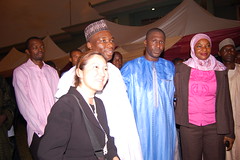Okene LGA
Historical Background
Okene Local Government Area was created in 1976 from the then Ebira Division by the Administration of General Olusegun Obasanjo, following the 1976 Local Government Reform. Ajaokuta and Ogori-Magongo LGAs were created from the old Okene LGA in 1991 and 1996 respectively. The people of Okene Local Government Area are a part of Ebira Tao people of the Central Senatorial District of Kogi State.
They are believed to have migrated from Jukun in the present day Taraba State and had a brief stopover in Idah before moving to its present location. The present Okene LGA is composed of Okene and Okengwe districts. There are 11 wards in the Local Government which are Bariki, Otutu, Orietesu, Lafia/Obessa, Okene-Eba, Idoji, Onyukolo, Obehira-Eba, Obehira-Uvete, Abuga/Ozuja and Upogoro/Odenku wards. The people are predominantly Muslims with a large size of Christian population too. To a great extent, there is a fusion of tradition and religions with only a negligible few still practicing exclusively traditional religion.
Geography
The Local Government is bordered by four Local Government Areas of Kogi and Edo State. It is bordered to the West by Okehi LGA, to the East by Ajaokuta LGA, to the North by Adavi LGA and to the South by Ogori-Magongo LGA and Edo State.
Okene LGA is located in the tropical zone, influenced by two climatic conditions namely: rain and dry seasons. The rainy season starts from April to October, while the dry season starts from November to April. The dominant vegetation of Okene Local Government Area by virtue of lying on the fingers of the equator, is interspaced with erect and numerous trunks of trees.
The ecological zone in which the Local Government is situated offers considerable potential for agricultural production.
Culture
Okene is composed of two main clans: Okovi and Agada. Okovi is further subdivided into Asuwe, Omavi, Ehebe, Eyire, Omoye, Adobe and onyi-Onwa clans while Agada is also subdivided into Akuta, Avi, Ogu, Ede Ohi-Monoko,and Esusu clans. The people are well known for the famous Okene cloth weaving, farming, hunting, commerce etc. Some of the traditional festivals include Ekuechi, Ebe, Eyika, Echane, Unehe (Ichekene and Ikede) and a host of others.
Natural endowment
The following are major solid minerals available in the Local Government and their industrial applications:
| S/N | SOLID MINERAL | INDUSTRIAL APPLICATIONS |
| 1 | Clay | Brick making, clay pipes, pottery, ceramics, building material, floor and wall tiles, furnace lining, electrical insulators, porcelain, sewer pipes. |
| 2 | Feldspar | Glass, pyrex, pottery, ceramics, fillers in plates and paints |
| 3 | Gemstones | Jewelry, ornaments and abrasives |
| 4 | Kaolin | Chalks, cosmetics, pharmaceuticals, fillers in paper, paints, adhesives and plastics |
| 5 | Marble (Limestone) | Glass, paints, lime, cement, ceramics, iron, steel refining, bleaching powder, calcium carbide, chemical and pharmaceutical products, fertilizers, filler in rubber and plastics, soap and detergent. In agriculture for livestock concentrates and land fertility. Building and furnishing, wall cladding, planadiana, monumental and ornamental items. |
| 6 | Quartz | Glass, lenses, refractory materials, porcelain, oscillation plate and in building construction |
| 7 | Sandstones (Silica Sand) | Road and building construction, ceramics |




Leave a comment